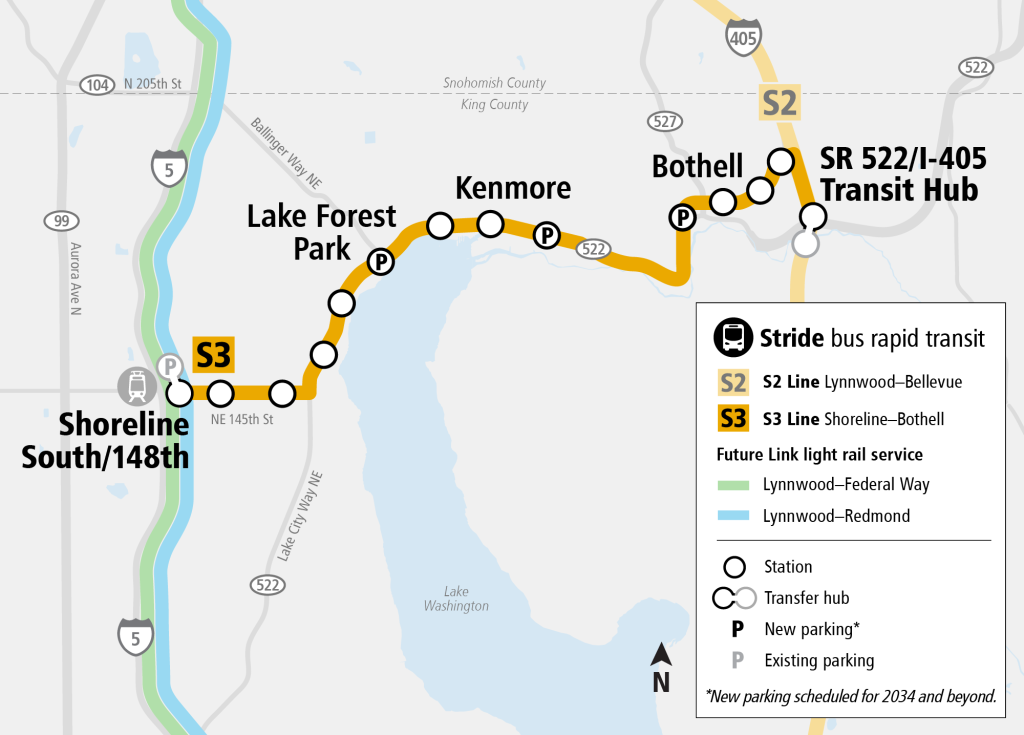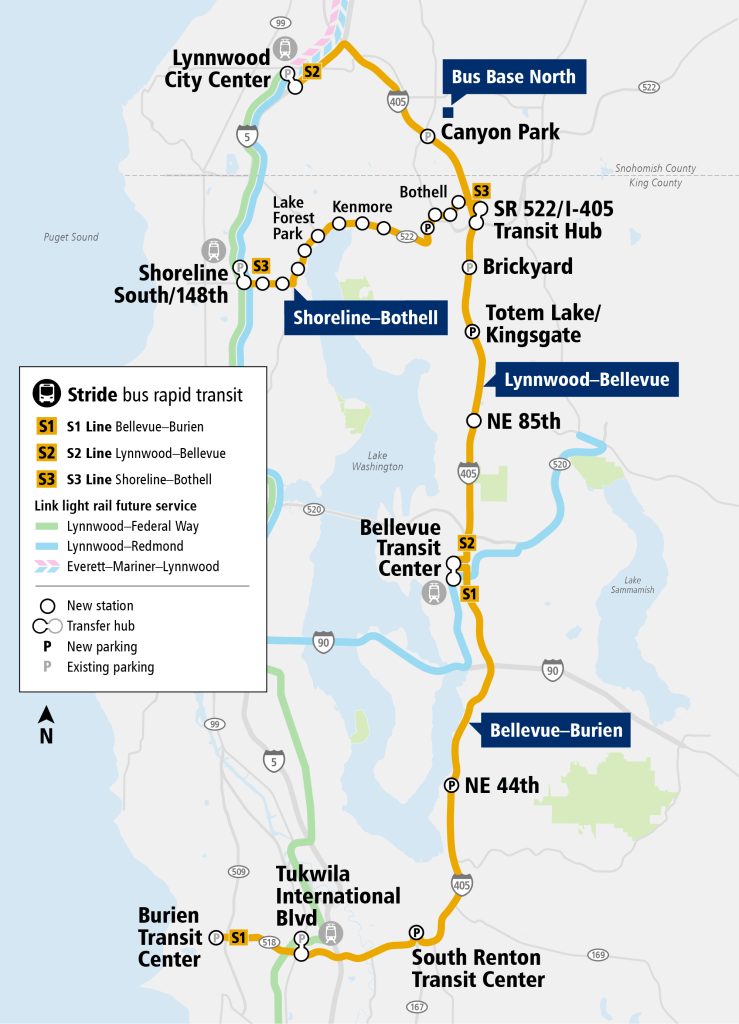
A group of transit advocates rallied along Bothell Way in Lake Forest Park Saturday to support swift completion of Sound Transit’s Stride S3 bus rapid transit (BRT) line between Shoreline and Bothell. Organized by the group Lake Forest Park for Bus Rapid Transit, the event was intended to illustrate support for a project that has been under siege by other groups who have been raising concerns about both construction impacts and long-term property impacts.
Saturday’s rally even brought out counterprotesters, with the transit advocates’ “Less Fuss More Bus” and “Build the Bus!” signs clashing with signs reading “Environmental Justice No BRT in LFP” and “A Better Way, Save Our Trees” signs. Among those counterprotesters was Paula Goode, Lake Forest Park councilmember and a co-founder of Citizens Organized to Rethink Expansion (CORE), the main group that has been pushing back against the project.

Later this year, the Sound Transit Board of Directors is expected to approve the first construction contracts for the project, allowing the agency to break ground. The entire Stride BRT system, which will consist of three lines extending all the way from Shoreline to Burien via the Eastside’s I-405 corridor, has been plagued by delays and cost increases.

Delays have been frustrating to transit advocates — and some Sound Transit board members — who had hoped that the bus projects in the 2016 Sound Transit 3 ballot measure would end up being implemented quickly to build momentum for the rest of the package. The S3 line, originally scheduled to open in 2024, is now planned to start service in 2028, under the assumption of beginning construction later this year.
Josh Rosenau, lead organizer for Lake Forest Park for Bus Rapid Transit and a Lake Forest Park resident, picked up on the theme of waiting long enough already at Saturday’s rally.
“I think we’ve waited long enough for the fast, quiet, accessible bus we were promised years ago. Lake Forest Park voted overwhelmingly for the ST3 bond in 2016, [with] 60% support and a majority in every precinct in the city. We want the Stride S3 line and we can’t wait for it to arrive,” Rosenau said. “We want this for our neighbors and neighbors-to-be. This region is growing rapidly, and if we don’t get people out of cars and onto buses, this road will be a parking lot.”

Once open, the S3 line will run every 10 minutes via all-electric articulated buses, with a full trip between Shoreline South Station and Bothell estimated at 26 minutes. Parking garages that were planned along the route at Lake Forest Park, Kenmore, and Bothell, have all been deferred to the 2030s or 2040s due to a financial reset Sound Transit undertook in 2021. A new Sound Transit express bus between Woodinville and Bothell is also planned as part of the S3 line, a route that will connect directly to Bellevue during peak hours.

Concerns in Lake Forest Park have been focused on impacts from property acquisitions to create a dedicated 1.2-mile business access and transit (BAT) lane along Bothell Way, one of the most congested segments of State Route 522 that Stride will follow. Work to add such a lane will require the removal of hundreds of trees and add a new retaining wall along the north side of the highway. The need for extensive land takings is due to the agency’s decision to build a new lane to host the northbound BAT lanes rather than converting an existing general purpose lane.
CORE has ramped up threats of legal action in recent months and announced that they’ve hired an attorney. The group has circulated materials that state that if Sound Transit wants to “avoid lawsuits,” then the agency will drop Lake Forest Park’s entire 1.2-mile BAT lane from its plans entirely, despite the benefit that dedicated space along the corridor would bring for riders. Alternatively, CORE also suggests delaying the entire project by two years, a move that would add significant costs on top of delaying the benefits.
In February, the group’s attorney sent a letter to Sound Transit saber-rattling about the need for the agency to reassess the project, but no official legal filings have yet been made.
“The simplest option is for Sound Transit to drop the plan to build the 1.3-mile northbound BAT lane in Lake Forest Park along Bothwell [sic] Way NE,” the letter stated, going on to contest Sound Transit’s analysis of potential time savings and bizarrely arguing that traffic along SR 522 won’t increase as the region’s population grows. “Ultimately, the cost, effort, and disruption of constructing this BAT lane wouldn’t even deliver the intended benefits, nor would the general purpose traffic increase in this section of the roadway.”
Members of CORE have also argued that the confluence of transportation-related construction projects planned at the same time, including lane reductions on I-5 as part of the Revive I-5 — which have already been scaled back — and work along 145th Street in Shoreline will create a “perfect storm” of traffic impacts. They argue that it falls to Sound Transit to adjust Stride to account for those other projects, despite voters approving the plan to move forward with the Stride system almost a full decade ago.

But transit advocates in cities from all over North King County are simply pushing for Sound Transit to stay the course and get shovels in the ground.
“We are standing here in Lake Forest Park, but it’s important to remember that this Stride S3 bus rapid project is going to benefit all of our North End communities of Seattle, Shoreline, Lake Forest Park, Kenmore, Bothell and Woodinville,” Katie Lorah, the Founder and Lead Organizer of the group Urbanist Shoreline, said.
“Reducing car trips can’t just be a personal choice, we need to have the infrastructure to support it,” Lorah continued. “Right now, the roads are built to prioritize single occupancy vehicle traffic and we need to make a big investment in alternatives. We need to make it easy and affordable and safe to opt in to daily trips on public transit, and that is exactly what the Stride S3 project does, with its dedicated bus lanes, streamlined payment system, and quick and easy boarding.”

Cecelia Black, an organizer with Disability Rights Washington’s Disability Mobility Initiative, noted that the Stride project will come with major upgrades for Bothell Way’s substandard sidewalks, increasing access even for those who don’t end up taking a bus, and improving safety. Delaying the project would also delay those improvements.
“For a century, we have invested almost exclusively around the car,” Black said. “As a result, non-drivers have less access to opportunities and are put in inherently more dangerous situations as road users outside of a car.”
Official action by the Sound Transit Board is likely a few months away. At this point Sound Transit appears to be moving full steam ahead, but supporters of the project aren’t taking anything for granted.
Ryan Packer has been writing for The Urbanist since 2015, and currently reports full-time as Contributing Editor. Their beats are transportation, land use, public space, traffic safety, and obscure community meetings. Packer has also reported for other regional outlets including Capitol Hill Seattle, BikePortland, Seattle Met, and PubliCola. They live in the Capitol Hill neighborhood of Seattle.


